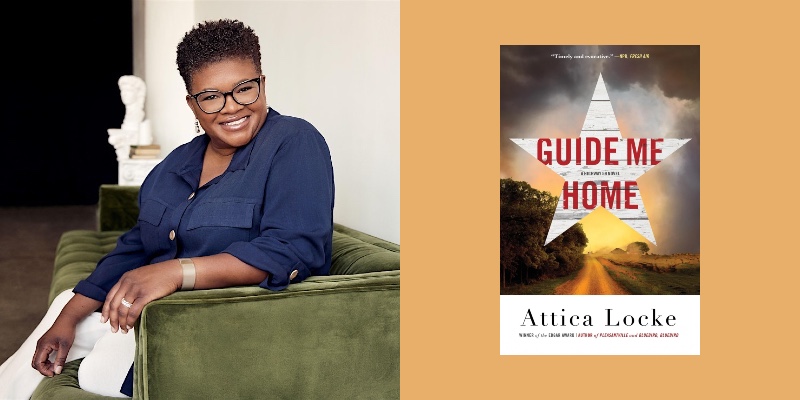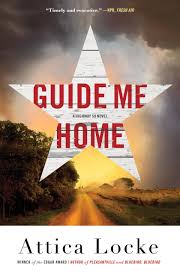As if gazing into a crystal ball—and through the prism of Ranger Darren Mathews’ battle against The Brotherhood’s murderous reign—Attica foresaw how the political climate would embolden white supremacy groups and how that would play out for a Black man with a badge and a gun. Darren is a man of honor, from a family devoted to the law. That doesn’t mean he doesn’t have his demons, though. In the series’ final installment, Darren meets those very demons head on. Some are familiar and others are not who he thought they were.
Nancie Clare
I am sad that Guide Me Home is the last installment of the Highway 59 series. I really like Darren Mathews. So, this is a writerly question: Did you always envision Darren’s story as a trilogy? Did you always see the story arc in three parts?
Attica Locke
Absolutely not. When I started this, I thought there might be five, six, seven books. In fact, when I ended Bluebird, Bluebird, it was time to start Heaven, My Home. I was like, ah, man, I ended on a cliffhanger, and I got to figure that out! No, I didn’t have any of them plotted out, but a couple of things happened. One is logistical: Having a life in television and realizing that as that increases, it means that the time between writing books gets longer, which means I could be writing this book series for fifteen years, which I had not anticipated. The other thing that happened was Covid, meaning I started a version of this book during lockdown when I was supposed to be shooting a television show from scratch.
I had always wanted to do a Highway 59 book [set] in Laredo because the actual Highway 59 [starts in] Laredo and goes all the way to Arkansas. That was next on my to-do list: Laredo. Only I couldn’t leave my house. And I was like, “Well, I can’t write this because I can’t go there.” So between that and the fact that these books will go on forever if I don’t contain it, I started thinking about closing it out. Then the other thing is, honestly, the Trump era. Guide Me Home inadvertently became a treatise on the Trump era in a way that I had not intended. When I wrote Bluebird, Bluebird, he was a candidate, like distant, it was like talking about a cat going to be president.
Nobody thought that [his candidacy] was real. And then after I’d written Bluebird, Bluebird it happened. And the book comes out and I look prescient. And for a character [like Texas Ranger Darren Mathews] who was dealing with white supremacy, who’s a thinking man dealing with what it means to have the responsibility of being in power, how would he not be interfacing emotionally with this time that we’re living in? And I think there’s also a part of me that is tired of writing about Trump in this way. And I think there’s a fantasy: If I just wrap up the series, it’ll go away.
And so much has changed. I can’t write about guns in the same way—there’ve been too many mass shootings. I can’t write about police in quite the same way—I’ve seen too many things. I just think there are a lot of ways in which the book series had to end up here, but I did not plan it. I was very scared to be my most honest self about where I truly believed that Darren Mathews would end up. I was afraid that people would reject it.
Nancie Clare
Well, no. I can’t see anyone rejecting Guide Me Home!
This strikes me as a story about love in all its permutations: true love, misguided love, self-serving love, misunderstood love, and the combinations thereof. Guide Me Home is a complicated story, a complicated love story.
Attica Locke
Yes. I think that what really flowers in this book is Darren navigating understanding how to love and is he worthy of love because of his relationship with his mother; him having to confront that. There’s a little bit of light in there, and I think you could find themes of love throughout them. Once I decided this is the end of the trilogy, there was no way to get through this without confronting his relationship with his mother. And there’s no way to do that without talking about love.
Nancie Clare
Guide Me Home begins as Darren is resigning from the Texas Rangers. His mother, Belle, who is now sober much to his surprise, comes to him and says that she’s concerned about a young Black woman who’s missing from the sorority house where Belle works as a cleaner. Darren is suspicious because he has what can only be described as a complicated relationship with his mother and also because he’s no longer a cop. He can no longer rely on his badge.
Attica Locke
Yeah, I love their dynamics so much, even though it’s toxic in some ways. I love Belle. She’s fun to write. She’s unhinged!
And how they misunderstand each other, the things Darren doesn’t know. I just really wanted them to come to some measure of imperfect healing. I just knew that the book series could not end without that. I don’t even remember the moment I went, “oh, she’s sober,” and how much that would so mess with his identity because “oh, well, my mom’s a drunk. There’s really much nothing I can do about the fact that I am born with it.” Then suddenly, if she’s sober, what does that say about Darren’s identity as a drinker? And I also liked the absurdity of these two kind of working a case together. I just thought that was funny and weird and bizarre and interesting…
Nancie Clare
And believable.
Attica Locke
Thank you, thank you, thank you. Oh my God, all of this is so moving to me because I was so, people are going to be like, what the fuck is she doing? What is Attica doing?
Nancie Clare
Well, not me, Attica. A lot of this book is Darren dealing with his identity: his identity as a son, his identity as a Black man in law enforcement, his identity as a person dealing with his demons, how he deals with his own personal mythology, how others see him, the lies he’s been told, and then what he discovers. Darren confronts his mother in a totally different way than he has in the previous books. And he learns things that quite frankly blow his mind. Once again, have you been prescient? Did you know that Guide Me Home was going to be a very ripped from the headlines kind of novel?
Attica Locke
Not at all, not at all. And I cannot express the breadth of my real, real fear. I was really, really torn up inside. I had no choice. This is the book that was supposed to be written. This is how Darren’s journey had to [conclude]. I think unconsciously, some of the mother stuff is actually me being the mom of somebody who’s going out into the world. The dedication of the book is to every mother whose child only knows half the story. There are things that my daughter doesn’t know about me that she may never know and may never need to know.
My husband teases me because I am somebody who after a book is written, realizes, “oh yeah, I guess I was thinking about that.” He thinks it’s very interesting—and telling—that on the eve of [our daughter] leaving home, I wrote about a young Black girl who went missing who was potentially in danger. He thinks I was working through some of my own anxieties. And I think he’s right. I have always believed that the unconscious mind, and certainly mine, is a better writer than my conscious mind.
Nancie Clare
I want to ask about what I think is one of the most interesting characters in the book: Joseph Fuller, the father of Serafina, the missing young woman. The Fuller family lives in a town called Thornhill, which is a locked-down company town like something from the early 20th century. Darren goes to speak to Joseph to find out where Sera is. During the interview, Darren sees a picture of Joseph Fuller at a Trump rally and he doesn’t even know how to deal with that. About Joseph’s justification to Darren when he sees the picture, you wrote, “I’m not going to follow any politician who don’t see me as a man with value. And that’s what they saw in me. A decent man who just wants to work for what’s his. Darren tried to think of words to explain that he was not required to do anything exceptional to deserve his country’s favor. But in the end, he saved his breath. Joseph Fuller was too far gone.” Where did this character come from? And are you all right?
Attica Locke
I got emotional just listening. It was kind of embarrassing to get emotional by your own words, but about not needing to do anything to be taken care of by your government or to be seen as worthy by your government… I can’t even remember when I got fascinated by writing about a Black Trump supporter, but they exist, some real and some fake. I mean some of them are just opportunist, whatever. But there are people for whom there’s something about [Trump] that is speaking to them. That there’s this feeling that Democrats see a Black person as needing help or being broken in some way and they must save us.
And I just found the psychology of it fascinating. I think this of white Trump supporters as well as Black Trump supporters, there is this feeling of looking down on government help, assistance, welfare, and social security; people getting mad about loan forgiveness. There’s a sense of “I had to suffer” instead of the sense of the whole point of society and governments is coming together as a tribe to share resources. That’s the whole point from time immemorial. This deeply toxic American idea of “’I’m doing it all by myself and screw everybody else,” or “if I did it, you better do it on your own.” It’s not reasonable that your self-worth comes from doing everything by yourself. That’s not humanly possible. And it just makes me sad. I felt a sadness in Joseph and to some degree the part of Darren’s mother who also believes in not taking help. I wish for my countrymen a realization that we are in this together. And that the entire point of the government is to share. I know people have different ideas about sharing stuff. I am a proponent of sharing of resources and feeling like there’s enough for all of us here and that’s why we help each other.
Nancie Clare
Thornhill isn’t real, is it?
Attica Locke
No, I made it up!
Nancie Clare
It was so realistic. I got scared!
Joseph may be politically too far gone, but he’s still a sympathetic character.
Attica Locke
Joseph’s desperate because of his child. And I think the part of the book that was clearly begun during Covid lockdown, my thinking about it is the twin issues of what I saw during lockdown: a government not doing its best to care for its citizens, specifically around health and healthcare; and the ways in which you saw how corporations, excuse my language, do not give a fuck about you. You have these essential workers out there just not getting treated well. And I think those things were in my head, and I think a lot of people who have had ill relatives or who had to deal with medical care have a kind of desperation [and are wishing there was a place like Thornhill] that would just relieve all of that [insecurity] and take care of my medical care, then fine, I’ll go along with the system. I will have a roof over my head. I will have my bills taken care of. I’ll have everything taken care of, but I won’t be building any kind of generational wealth. I’ll just be existing and that that’s about all I can hope for in this lifetime.
Nancie Clare
That’s a heartbreaking way of looking at it.
Is there anything you want to add about what you’d like reader to take away from Guide Me Home?
Attica Locke
I would add that part of the Trump approach to Black voters has been specifically targeted to men. There’s a level around men’s ideas of masculinity and identity that’s connected to stuff like standing on your own, not needing anybody, not being seen as a burden. There’s a toxic masculinity thread in there. We are living in such a weird time with AI and for all I know, maybe Candace Owens is fake! For all I know there aren’t any real Black Trump supporters. Joseph Fuller was believable to me, and I do know that whether or not we were talking about Black Trump supporters, there have been Black Republicans that have—and I’ve had some in my family—who have had the same kind of way of thinking that Democrats are in some way looking down on them by recognizing institutional generational fucking trauma and problems that this country created that that need fixing. And they don’t want to feel like they’re less than, like they need help.


















